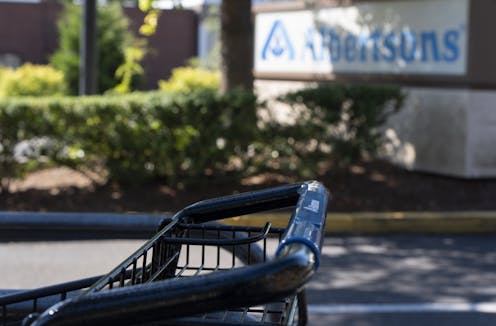What’s next for Albertsons after calling off its $25B grocery merger with Kroger: More lawsuits
- Written by Christine P. Bartholomew, Professor of Law, University at Buffalo

Albertsons announced on Dec. 11, 2024, that it had called off an attempted merger with Kroger[1] and would sue Kroger for breach of contract. The US$25 billion deal, first announced in 2022, would have combined Cincinnati-based Kroger, already the largest traditional U.S. supermarket chain[2], with Boise, Idaho-based Albertsons, which is currently the third-biggest grocer.
The Conversation U.S. asked Christine P. Bartholomew[3], a professor at the University at Buffalo School of Law who researches consumer protection, to explain how the merger failed and why it matters.
Which supermarkets belong to the two companies?
Kroger has 28 subsidiaries with nearly 2,800 supermarkets[4], including Harris Teeter, Dillon’s, Smith’s, King Soopers, Fry’s, City Market, Owen’s, JayC, Pay Less, Baker’s Gerbes, Pick‘n Save, Metro Market, Mariano’s Fresh Market, QFC, Ralphs and Fred Meyer.
Albertsons owns and operates more than 2,200 supermarkets[5] through its many brands. They include Safeway, Vons, Jewel-Osco, Shaw’s, Acme, Tom Thumb, Randalls, United Supermarkets, Pavilions, Star Market, Haggen, Carrs, Kings Food Market and Balducci’s.
Kroger and Albertsons also operate supermarkets branded with their own names.
Had the merger gone forward, it would have been the largest of its kind in U.S. history, affecting millions of grocery shoppers.
To ward off regulators’ concerns, prior to canceling the transaction, the chains announced in 2023 a plan to sell hundreds of their supermarkets[6] across the United States to C&S Wholesale Grocers. They updated this plan[7] in 2024, pledging to not close any stores.
Why did Kroger want to acquire Albertsons?
The companies argued that they needed to join forces[8] to compete against even bigger online and big box retailers. In recent years, Walmart and Costco have gained market share[9], while other chains have held steady or lost ground.
The companies also feared stiff competition from dollar stores, one of the fastest-growing segments of U.S. retail[10].
The federal government opposed the merger, with the U.S. Federal Trade Commission suing[11] to block it. Had the deal gone through, the new company would have cemented its position, ensuring it has the largest market share for grocery purchases after Walmart.
What happened in court?
In February 2024, the FTC, along with state attorneys general[12] representing consumers in eight states – Arizona, California, Illinois, Maryland, Nevada, New Mexico, Oregon and Wyoming – filed a federal lawsuit in Oregon to block the merger. So did the District of Columbia’s attorney general.
This wasn’t the only legal challenge the merger faced. The Washington[13] and Colorado[14] attorneys general both filed suit in their own states to block the merger.
After hearings in both cases and months of uncertainty, the judges in both Oregon and Washington issued their rulings.
U.S. District Court Judge Adrienne Nelson, in Portland, Oregon, issued a preliminary injunction[15] on Dec. 10, which blocked the merger[16] pending the outcome of the administrative proceedings before the FTC.
A few hours later, Judge Marshall Ferguson in Seattle[17] issued a permanent injunction barring the merger in Washington state only. Both judges determined that the merger risked significantly reducing competition and that the companies didn’t offer enough evidence that the merger would help consumers.
“We’re standing up to mega-monopolies to keep prices down,” Ferguson said. He called the injunction “an important victory for affordability, worker protections and the rule of law.”
Albertsons and Kroger’s plan to offload stores to C&S[18] didn’t impress the judges. Not only did Nelson find the divestiture insufficient in scale, but she ruled it was “structured in a way that will significantly disadvantage C&S as a competitor.”
Albertsons v. Kroger
The morning after the Washington and Oregon decisions were issued, the deal was dead.
Albertsons announced it terminated the merger agreement, citing the court decisions[20].
Both companies still face significant legal challenges, though. Five minutes after announcing its intent to back out of the deal, Albertsons issued a second press release announcing it had filed a lawsuit against Kroger[21].
Albertsons said Kroger willfully breached the deal “by repeatedly refusing to divest assets necessary for antitrust approval, ignoring regulators’ feedback, rejecting stronger divestiture buyers and failing to cooperate with Albertsons.” The suit seeks significant damages, including “billions of dollars[22]” for lost shareholder value and legal costs, as well as a $600 million merger breakup fee.
In response, Kroger said[23] that “Albertsons’ claims are baseless and without merit.”
Albertsons’ suit against Kroger is pending in Delaware Court of Chancery[24], which hears many legal business disputes. The complaint remains temporarily under seal.
This article includes passages that appeared in an article about the proposed merger that was published on Feb. 28, 2024[25].
References
- ^ attempted merger with Kroger (www.albertsonscompanies.com)
- ^ largest traditional U.S. supermarket chain (www.foodindustry.com)
- ^ Christine P. Bartholomew (scholar.google.com)
- ^ Kroger has 28 subsidiaries with nearly 2,800 supermarkets (www.thekrogerco.com)
- ^ Albertsons owns and operates more than 2,200 supermarkets (www.albertsonscompanies.com)
- ^ plan to sell hundreds of their supermarkets (ir.kroger.com)
- ^ updated this plan (ir.kroger.com)
- ^ companies argued that they needed to join forces (www.nbcchicago.com)
- ^ gained market share (www.grocerydive.com)
- ^ fastest-growing segments of U.S. retail (www.npr.org)
- ^ U.S. Federal Trade Commission suing (www.ftc.gov)
- ^ state attorneys general (www.cbsnews.com)
- ^ Washington (www.npr.org)
- ^ Colorado (coag.gov)
- ^ issued a preliminary injunction (cdn.theconversation.com)
- ^ blocked the merger (apnews.com)
- ^ Judge Marshall Ferguson in Seattle (www.atg.wa.gov)
- ^ plan to offload stores to C&S (www.promarket.org)
- ^ Elijah Nouvelage/AFP via Getty Images (www.gettyimages.com)
- ^ citing the court decisions (www.businesswire.com)
- ^ filed a lawsuit against Kroger (www.businesswire.com)
- ^ billions of dollars (www.npr.org)
- ^ In response, Kroger said (ir.kroger.com)
- ^ Delaware Court of Chancery (courts.delaware.gov)
- ^ published on Feb. 28, 2024 (theconversation.com)







